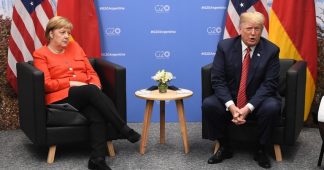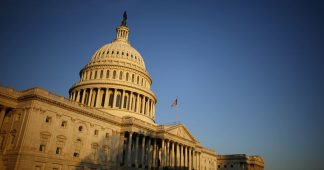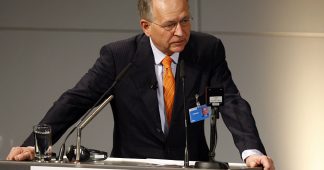By Adam Taylor
The alliance between the United States and Germany is one of Washington’s most historically important and stable, with Europe’s largest economy not only proving an important political and trade partner but also hosting roughly 38,000 U.S. troops across a number of military bases.
But with just weeks to go before a potentially contentious meeting of NATO leaders in London, a new poll suggests that the two largest nations in the alliance (in terms of economy and population) have very different views of their relationship – and, in particular, that Americans are overlooking considerable doubts among Germans.
The poll, jointly conducted by the Pew Research Center and the German firm Körber-Stiftung in September, found that while three-quarters of Americans see relations with Germany as good, almost two-thirds of Germans say the relationship is bad.
The responses also suggested that the two nations placed different levels of importance on the alliance. The poll found that Americans are more likely to prioritize greater cooperation with Germany, with 69% in favor, compared with 50% of Germans who say the same of increased cooperation with the United States.
U.S. military bases in Germany, a legacy of American occupation after World War II and subsequent cooperation through NATO, drew similar divisions – 85% of Americans said they were important for U.S. national security, while 52% of Germans said the same of German security.
Pew has partnered with Körber-Stiftung in the past three years to conduct comparative polling, and the results have been consistent: Germans have negative perceptions of the alliance, peaking with almost three-quarters expressing negative feelings in 2018, while American views of Germany are gradually becoming more positive.
These tensions may come to a head when German Chancellor Angela Merkel and President Donald Trump meet in London for NATO’s 70th anniversary on Dec. 4. Both world leaders will bring their own sets of political circumstances: Merkel recently announced that she would stand down as leader before 2021, while Trump is campaigning for the 2020 presidential election.
Sudha David-Wilp, a senior transatlantic fellow at the German Marshall Fund in Berlin, said German pessimism about the relationship with the United States was in no small part due to the behavior of an American leader who has demanded that Germans spend more on the military and threatened auto tariffs on German companies.
“President Trump is an existential threat to Germany,” David-Wilp said, noting that previous Pew polls had shown confidence in the U.S. president dropping to 10% last year, down from a high of 93% at the start of the Obama administration.
But David-Wilp noted that Trump was only the latest rocky patch in recent years, following disputes over the invasion of Iraq in 2003 and the revelations 10 years later that the United States spied on Merkel. The differing views of the alliance may be due in part to an information gap between Germans and Americans, she said.
“Germans are definitely well-informed when it comes to current affairs,” she said, as their nation is central to European policy and has an export-driven economy. Americans, on the other hand, tend to think of themselves as the “middle of the world, the center of the universe.”
Despite Trump’s frequent criticisms of Germany and cold personal relationship with Merkel, the survey data shows that the majority of Americans disagree with him. Almost 70% of Americans want closer cooperation with their European allies, and half say Europe should keep its defense spending at roughly the same level – an increase from 37% in 2017.
The U.S. president has at points criticized the presence of U.S. bases in Germany, and his administration has taken steps to consider whether troops could be withdrawn from the country. But Pew’s polling data showed that 5% of Americans thought the bases weren’t important at all, compared with 56% who thought they were very important.
Fifteen percent of Germans said the bases were very important to German security; the same number said the bases were not important at all.
If Trump’s negative reputation among Germans makes them skeptical of the alliance, Merkel’s positive reputation may boost it among Americans: 55% of Americans felt positive about the German leader in the most recent Pew polling from last year, a considerably higher proportion than for most countries surveyed.
But with Merkel due to step down, that may change. This month, one possible successor – Defense Minister Annegret Kramp-Karrenbauer – announced that Germany would increase its defense budget by tens of billions of dollars in the coming years. The announcement came the same week as remarks by French President Emmanuel Macron that NATO had suffered “brain death.”
An increase in spending was “not because the American president – and not just the current one – demands that, but because it is in our own security interest,” Kramp-Karrenbauer said at an event in early November.
Körber-Stiftung’s recent polling suggested that Germans were divided about defense spending, with 40% in favor of an increase. However, this was a rise from 2017, when 32% favored increasing defense spending.
Published at https://www.thehour.com/news/article/Germans-are-deeply-worried-about-U-S-alliance-14862407.php











